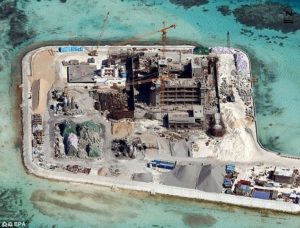by WorldTribune Staff, July 12, 2016
China has no legal basis for its claim to most of the South China Sea, a tribunal ruled unanimously on July 12.
Additionally, Beijing has aggravated regional disputes with its construction of artificial islands that “destroyed coral reefs and infringed on the Philippines’ exclusive economic zone,” a five-member panel from the Permanent Court of Arbitration in The Hague ruled.

Beijing rejected the ruling by the court organized under a treaty signed by UN member nations including China. Although the tribunal has no enforcement apparatus, the multiple nations in maritime territorial disputes with China see the ruling as a powerful rebuke to Beijing.
Japan’s Foreign Minister Fumio Kishida said the tribunal’s decision is “final and legally binding” and that the two sides should comply with it. He said in a statement that “Japan strongly expects that the parties’ compliance with this award will eventually lead to the peaceful settlement of disputes in the South China Sea.”
See Also: China’s quiet space warfare launch poses threat to military satellites, July 10, 2016.
“The Philippines strongly affirms its respect for this milestone decision as an important contribution to ongoing efforts in addressing disputes in the South China Sea,” Philippine Foreign Secretary Perfecto Yasay said in Manila, calling on “all those concerned to exercise restraint and sobriety.”
Former Foreign Secretary Albert del Rosario, who helped oversee the filing of the case, said the ruling underscored “our collective belief that right is might and that international law is the great equalizer among states.”
Del Rosario stressed that it was important for the ruling to be accepted by all.
“For the sake of maintaining international order, it is imperative that the Award and clarification of maritime entitlements be accepted by all relevant countries – without exception – so that we can work together on how remaining issues can be peacefully resolved,” he said.
The panel also found that China had interfered with Philippine petroleum exploration at Reed Bank, tried to stop fishing by Philippine vessels within the country’s exclusive economic zone and failed to prevent Chinese fishermen from fishing within the Philippines’ exclusive economic zone at Mischief Reef and Second Thomas Shoal.
China, which boycotted the entire proceedings, said it does not accept the panel’s jurisdiction. China “solemnly declares that the award is null and void and has no binding force. China neither accepts nor recognizes it,” a statement from the foreign ministry said.
A professor of Asian political economy said the ruling could be a “transformative moment” in the region.
Speaking outside the Peace Palace in The Hague, Leiden University professor Jonathan London said the decision will “give countries with a common interest in international norms something to point to and to rally around.”
He said they can say to China: “Look, here are the results of an international organization that has found that your claims have zero historical basis.”
